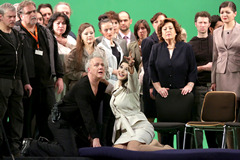| Opera Reviews | 2 May 2024 |
La Scala debuts The Tsar's Bride with a committed performanceby Silvia Luraghi |
|
| Rimsky-Korsakov: The Tsar's Bride Teatro alla Scala, Milan 14 March 2014 |
|
|
Love and sex are symbols of power: Grigorij’s dismissed mistress Ljubaša also seeks help from Elisej, and becomes a victim of sexual abuse. Real feelings do not count: the Tsar’s choice is announced at the celebration of the engagement of Marfa with Lykov, but this does not stop Grigorij from pursuing his enterprise and pouring the love potion in the girl’s cup. When Marfa falls ill, the tragedy breaks out: the potion had been prepared for Ljubaša who intended to kill Marfa out of jealousy, and while the poisoned girl in her folly mistakes Grigorij for her lover, he takes revenge over Ljubaša and kills her. The production, staged and directed by Dmitri Tcherniakov, was co-produced with Berlin’s Staatsoper Unter den Linden. The director staged the action in modern times, and focused on the quest for power. He took as a starting point the fact that the title seems to indicate a main protagonist, Ivan the Terrible, who however remains silent, and does not take part in the action. During the overture, the oprichniks chat online (the forum was projected on a screen over the stage), discussing the idea of spreading the rumour of a new Tsar, creating a virtual figure, and try to give credibility to their fiction by finding a real bride for him. The media are presented as modern vehicles of power, and their presence is pervasive during the whole performance. Even in the second act, when Marfa joyfully tells her friend Dunjaša about her love for Lykov, the television in her room is on, and a news report is showing images of the mysterious new Tsar. In the last act, Marfa, whose betrothal with the Tsar has been officially announced, is sitting with beauticians who take care of her make up. When her folly breaks out, and she starts to fade away, she is immediately replaced with fake images on television, and the audience is shown a perfect Tsarina while she dies. The opera is very popular in Russia, but is not frequently performed in the West, and features a number of beautiful arias and duets, especially in the parts for female voices. The vocal cast was outstanding, and both Marina Prudenskaya (Ljubaša) and Olga Peretyatko (Marfa) sang touchingly. The most moving part of the performance was the second act, with the duet between Marfa and Dunjaša (the latter was Anna Lapkovskaja, also very well prepared), and Ljubaša listening and commenting outside Marfa’s home. Among the male principals, Johannes Martin Kränzle was an arrogant Grigorij, while Pavel Černoch was a temperamental Lykov. Stephan Rügamer, as Elisej Bomelij, the alchemist who prepared the potions, had a conveniently unsetting appearance. Daniel Barenboim conducted with deep commitment, and the orchestra responded with zest. The audience appreciated the novelty, and applauded warmly all concerned.. |
|
| Text ©
Silvia Luraghi Photo © Brescia/Amisano © Teatro alla Scala |

 Conductor Daniel Barenboim returned to La Scala for the company premier of Rimsky-Korsakov’s The Tsar's Bride (Carskaja Nevesta). The libretto by Il’ija Tijumenev depicts a love strife between Tsar Ivan the Terrible and the suitors of the girl he chooses as his future wife. Set in the 16th century, the plot is rather about power and dominance than about love: the oprichnik Grigorij who tries to win Marfa’s love through the love potion prepared by Elisej seems more interested in having her as a sign of his power than out of love for her.
Conductor Daniel Barenboim returned to La Scala for the company premier of Rimsky-Korsakov’s The Tsar's Bride (Carskaja Nevesta). The libretto by Il’ija Tijumenev depicts a love strife between Tsar Ivan the Terrible and the suitors of the girl he chooses as his future wife. Set in the 16th century, the plot is rather about power and dominance than about love: the oprichnik Grigorij who tries to win Marfa’s love through the love potion prepared by Elisej seems more interested in having her as a sign of his power than out of love for her. 





